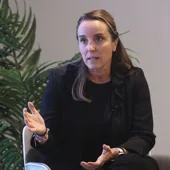Packaging, essential for protecting and preserving products, generates a large amount of waste that must be managed appropriately, in times when the progress of the circular economy results in an undoubted benefit to society. We find ourselves, therefore, in a unique opportunity to rethink the role of packaging, converting them into new raw materials and resources of renewed value. Innovation, collaboration, change of mentality are established as necessary vectors for a future in which packaging is part of a regenerative cycle instead of a disposable problem.
This transition towards a more sustainable model, which involves the entire value chain (selection of renewable raw materials, eco-design, recycling technologies and efficient systems to recover these resources, etc.) was the focus of the opinions of the specialists. of a new edition of the ABC Natural Forum (in this case, ‘Packaging of the future’, under the moderation of the person in charge of ‘Natural’, Charo Barroso. Sector experts such as Isabel Goyena, director of ENVALORA; Miguel Aguado, managing partner of B LEAF sustainability and communication consultancy and Virginia Rodríguez, Head of Sustainability at Tetra Pak Iberia, made clear the importance of the collaboration of all the agents involved in the sector at a time when the packaging is as important as the product.
The meeting began by highlighting the relevance of the implementation of the Royal Decree on Packaging and Waste, which establishes, by next 2025 and, among other provisions, that all companies considered product producers, that is, those that put packaging in the national market or import/acquire packaged products intra-community, they must join a SCRAP (collective RAP system – Extended Product Responsibility -) such as ENVALORA or create their own SIRAP (individual RAP system.

«Sustainability is increasingly linked to economic management, quality, and the optimization of resources and processes»
In this environment, Isabel Goyena pointed out how “we are facing a step forward in the value chain, facing the responsibility of the companies that put packaging on the market to organize and finance the management of waste from said packaging.” A new era in which, as the ENVALORA spokesperson indicated: «the industry has been proactive in seeking to comply with the RAP obligation collectively. “That is why the system was created to APPRECIATE all industrial and commercial packaging, whether single-use or reusable.”
Time of challenges
A time, therefore, of challenges, as Miguel Aguado pointed out: «In Spain, the industry manages its waste well (we have, for example, the first European ‘Circular Lab), there may be some delay, but the objectives will be met. , although the challenge is found on fronts such as the rural environment, SMEs and hospitality, large events, etc.».
A performance that concerns the entire society and that begins from the design of the packaging itself, from ecodesign. «We are heading (commented Aguado) to the resource with less quantity of material, less diversity, greater ease in recovery. To give an example: the fact that the corners are cut on a yogurt container means a saving of 9% of plastic. And the suitability of the (‘unpopular’) measure of attaching the cap to the packaging “a European obligation, for a better recycling result” was recalled.

«We actively work with all interested parties to develop the market for recycled materials from our packaging»
Times of efficiency and compliance that go beyond the mere fulfillment of the 2030 Objectives, but also represent a new economic-business paradigm, around greater and better efficiency in digitalization, logistics, finances, traceability, guarantees of various types (such as food safety), etc. Virginia Rodríguez, from Tetra Pak Iberia, emphasized the importance of working “actively with all interested parties to improve recycling infrastructure and also to develop the market for recycled materials from our packaging.” And he also added the importance of “introducing plant-based polymers and recycled plastics, as well as the use of renewable energy (in our activity in Spain we use electricity from 100% clean sources), to advance towards our goal of creating the most sustainable product in the world, made entirely from renewable or recycled raw materials, responsibly managed, completely recyclable and carbon neutral. The use of “long, virgin fiber makes our packaging highly appreciated by recyclers and the cardboard industry,” highlighted Virginia.

«Implementing environmental economic policies do not put a brake on the economy but rather encourages respectful and sustainable activities»
Virginia Rodriguez
Tetra Pak Iberia
Various contributions to a virtuous circle in which Goyena pointed out the paradox that the same law affects both large companies and SMEs and micro-SMEs: «In any case, aspects such as administrative authorization generate confidence in the sector and can be a boost for these new times, in which the new regulation will make the packaging almost as important as the product itself.
Scalable compliance
In any case, at all times, participants stressed the importance of cascading information and awareness, from large corporations to citizens (from adolescents to the ‘senior age’); the relevance of pilot projects and of specifically considering the particularities of each sector (retail, the chemical industry, construction…); the expectation regarding measures such as deposit remuneration, etc.
A renewed scenario in which, in the case of companies, as Aguado pointed out: “the environmental effort, the so-called ‘scope three’ (not only what I do, but what my suppliers do), with new criteria in the purchase price. It is no longer time to talk about a ‘green bathroom’, but rather that sustainability is part of the business. In fact, as the specialist added: “Just five or six years ago, the areas of sustainability were, in many cases, collateral, and now they are increasingly linked to economic management, quality, and resource optimization.” and processes.
There are just over two months left for this new phase of the circular economy in Europe, in Spain. To this end, as Goyena concluded: «The main challenge is raising awareness among the thousands of companies in Spain, to be aware of this new responsibility, and this year and next will be essential. Things are being done well… but there is a lack of traceability and information about what is being done in this regard. Hence the importance of digitalization. Technology and people (from their homes, from companies) as keys to success in the sustainability journey, in the face of a regulatory body that establishes future obligations to incorporate recycled materials, to develop and consolidate a better planet.
#packaging #important #product

